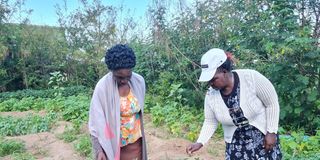Guardians of the grain: Two Nakuru women fighting to save indigenous crops from extinction

Penina Ngahu (left) and Beatrice Wangui observe a plant at the Seed Savers Network compunnd in Gilgil after an interview with Mtaa Wangu on May 16,2025.
The act of planting, studying and multiplying seeds is often seen as a preserve of research institutions, led by well-educated scientists, with lab coats and big spectacles to match.
But what if I told you this is not the case?
Meet Beatrice Wangui and Penina Ngahu; two women from Nakuru’s Gilgil sub county, teaching small scale farmers like them to be plant breeders.
For Peninah, this new path was revealed to her in 2016. Then, she had adopted the usual farming practises; buy seeds from an agrovet, get the suggested fertilizer and put some money aside for pesticide that would sure come in handy.
However, the people at Seed Savers Network, an organisation that champions improved seed access came with a different story.
“We were taught about indigenous varieties of different crops and how to plant them without pesticides. I was surprised to learn this was possible,” Penina recalls.
On top of that, she was introduced to the term known in agriculture circles as ‘characterization.’
Simply put, this means studying a certain variety by planting it and documenting certain specific characteristics like how long it takes to germinate, the colour of flowers, size of the leaves and whether it is prone to diseases or not.
“Little did we know that this process would unlock a fortune we never knew existed,” she adds.
The realization was the same for Wangui in 2018, whose first rodeo included learning about managu.
This was a vegetable she had grown up eating but did not know that there were various varieties.
“I was surprised to learn that some managu varieties have small leaves, others big and even the flowers are different. I also observed that the one with small leaves was tangier,” she says as her eyes light up, still visibly impressed by this finding.
Another intriguing discovery that Wangui made was how indigenous managu had medicinal value in giving relief to the stomach if one was bloated.
Now that they had been introduced to this world of indigenous foods, Wangui and Penina knew that they had to, like the disciples in the bible, spread the gospel.
“We do not want to keep the seeds to ourselves alone but want to pass it on to other farmers as well. That is where the seed fair mashinani comes in,” Penina tells me.
This fair is different from the others, in that farmers show up with seeds and the produce equivalent.
But instead of just buying seeds, the farmers exchange and at times even donate some of them to those interested, all to ensure as many farmers as possible multiply the characterised indigenous variety.
Seeing how shocked I am by the concept of donating, Penina tells me it’s no big deal, as the point is to distribute the seed and not hoard it.
Away from the seed fair, the farmers also sell these organic indigenous vegetables to traders who specifically want organic produce.
“While a kilogram of exotic managu is Sh 70, a kilo of organic indigenous managu goes for Sh 120. You’d be surprised to learn that the demand is so high, we can’t satisfy it,” Penina says proudly.
She adds that they never look for the market, instead, individuals and organizations like Nyakazi organics look for them.
So is there a plan to pass down the knowledge of these indigenous foods to the younger generation?
According to Penina, this is done through farmer groups. In her own, made up of 25 farmers, four are in the youth bracket.
“Our hope is that this knowledge remains with the younger generations and they too pass it along,” she says smiling.
Mr Dominic Kimani, the monitoring, evaluation and learning officer at Seed Savers Network, says the next phase in preserving this traditional knowledge, would be registering the varieties that the farmers come up with.
“It is unfortunate that currently if a seed is not in the national variety list it doesn’t exist. Which means any one can go and register a seed indigenous to Kenya and call it their own,” Kimani says.
He continues to explain how absurd this is, as 80 percent of seeds in Kenya are owned by farmers, as they have existed for years.
According to Chapter 2 article 11 (3b) of the constitution, Parliament is tasked with enacting legislation to recognise and protect the ownership of indigenous seeds and plant varieties, their genetic and diverse characteristics and their use by the communities of Kenya.


